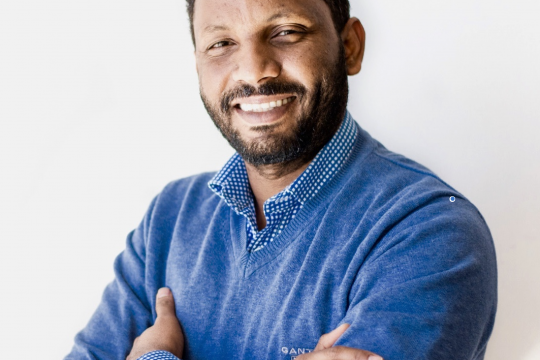In Ethiopia, research institutions face several challenges, including limited resources and institutional capacity. There has also been a significant gap between the work done by researchers and that of policy makers. Dr Haileselassie Medhin recognized early on that Ethiopia’s ambitious green growth plans could be supported by creating a platform where researchers and policy makers meet and discuss priorities aimed at addressing environmental issues and poverty reduction in the country. That is why he chose to work with the Environment for Development (EfD) Initiative, located at the Ethiopian Development Research Institute.
“Over time, EfD as a network has built up a lot of credibility within research in the intersection of environment and development, and its model for policy impact is effective in practice,” says Medhin.
“Our EfD center in Ethiopia has drawn on the resources and expertise in the global network, and at the same time our research team has worked hard to interact and build trust with local decision makers, stakeholders, and donors. We believe that this has been crucial in laying the foundation for us as researchers so that we can contribute with scientific insights into national policy processes, that in turn will have a massive impact on people’s lives in Ethiopia.”
Medhin completed a PhD program in environmental economics at the University of Gothenburg in 2013, supported by Sida. His research has focused on the application of behavioral and experimental economics on issues of environment and development, and increasingly on the challenges and opportunities for achieving green and climate resilient growth in low income countries. After some time as a post-doctoral researcher at the Department of Economics in Gothenburg, Medhin returned to Ethiopia to become the Director of the Environmental and Climate Research Center (ECRC), also known as EfD Ethiopia. This is located in the Ethiopian Development Research Institute, a leading think-tank and research center in the country’s capital Addis Ababa.
Part of what motivated Medhin to return to Ethiopia was the country’s newly adopted Climate Resilient Green Economy (CRGE) strategy, which was published in 2011. This is one of the most ambitious green growth strategies in the world. Medhin recognized early on that researchers like himself could play an important role in the implementation of this progressive strategy. For instance, he knew that evidence-based economic insights could contribute to policy design, and that the center could follow up on what the actual impacts are of policies that have already been adopted by the state.
To ensure that research has real-world impact, policy makers must have the information they need when they are making decisions on important development and environmental issues. To support this, Medhin and his team at ECRC established a platform where continuous dialogue can take place with government officials and other stakeholders to build a strong partnership over time. This has included discussions at an early stage in selection of research topics, so that researchers have insights into the priorities of other stakeholders, and throughout the research process, so that there is a ready audience once the research results are finalized. Medhin has put great emphasis on ensuring he and his team are available to policy makers when needed, and that researchers have an in-depth understanding of the challenges confronting society, as well as tradeoffs that policy makers must make.
One concrete example of work carried out at ECRC, in collaboration with other institutions, is the development of a decision tool to reduce the consequences of drought and flooding in vulnerable areas of the country. ECRC also partnered with the World Bank and the government to identify key challenges of achieving the green growth strategy, and identifying actionable pathways for different sectors of the economy. Other examples of work done by Medhin and his team include examining the potential of a carbon tax in Ethiopia, and contributing to the operationalization of a national monitoring and evaluation system for green growth.
Many EfD centres have been established around the Global South, funded entirely by Sida. The ambition is that, in the long term, centers will attract funding from a range of donors. Sida now only provides about one third of the budget support for the EfD center in Ethiopia, as the center has attracted both national and major international donors under Mehdin’s directorship. He has shown that, with the right organizational set-up and systems, it is possible for local research institutions in countries like Ethiopia to compete for research funding in the international arena.
“It would have been impossible to develop the necessary systems without EfD’s support, which goes back more than a decade,” Medhin says.
“In the past few years, we have shown that the platform to encourage dialogue between researchers and other stakeholders has been very effective, in terms of integrating environmental economics capacity into decision- making. It has attracted funding from major international donors. Over time, it creates a strong link between research, donors, and policy makers. This makes our center a hub for ideas and a channel for the government to learn about new scientific findings. This approach also makes the EfD center a very attractive workplace for talented researchers who aim to have an impact on the future development of Ethiopia,” says Medhin.
